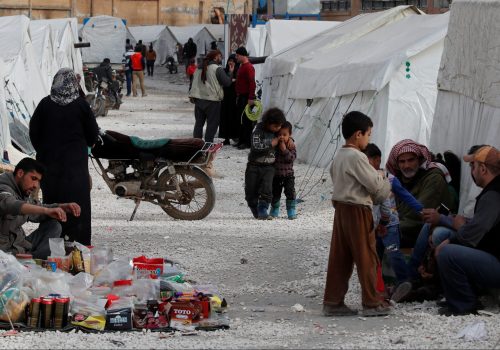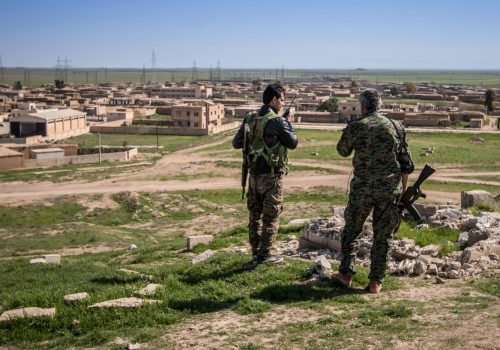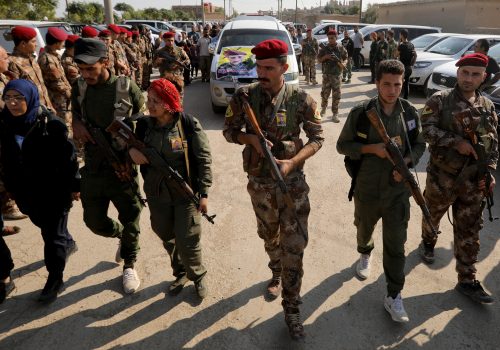Are Putin and Erdogan doing territorial swaps in Syria again?
Two weeks before meeting his Turkish counterpart in the Russian resort city of Sochi, Russian President Vladimir Putin had received Syrian President Bashar al-Assad in Moscow on September 14.
In his meeting with Assad, Putin made jabs at foreign forces in Syria, describing their presence as illegal—a reference to the United States and Turkey. Days later, Russian and Syrian armies escalated their military operations in Idlib province—the last remaining stronghold opposed to the Assad regime—after eighteen months of relative calm. On September 26, Russian fighter jets struck a Turkish-backed Syrian militia in Efrin north of Aleppo city, before striking the Idlib countryside in areas that had been untouched since the last ceasefire went into effect in March 2020.
Just weeks before, on September 9, Russian Foreign Minister Sergey Lavrov reminded the world that Turkey had not lived up to its commitments in Idlib, referring to an earlier pledge by President Recep Tayyip Erdogan to purge Hayat Tahrir al-Sham (HTS)—a former al-Qaeda affiliate in Syria previously known as Jabhat al-Nusra—from the province. Turkey had agreed to purge Idlib from HTS by mid-September 2018.
It missed that deadline and all others outlined by Moscow since then. Turkey had also failed to re-open the main Latakia-Aleppo Highway (M4), which is crucial for trade from the coastal area, a stronghold of the regime, and Aleppo, the second-largest city in Syria. Per its commitments, Ankara was to lead joint military patrols and create a buffer zone six kilometers on both sides of the M4.
In response to Russia’s escalation, Erdogan sent military reinforcements to the frontlines in the countryside of Idlib. On September 27, Turkish Defense Minister Hulusi Akar condemned Russia, claiming that it contradicted the ceasefire reached by Putin and Erdogan in March 2020. Speaking from the Turkish-Syrian border, Akar said that his country couldn’t handle a new wave of Syrian refugees, adding that Turkey will prevent such a mass exodus by ensuring safety and stability in the region.
A difficult summit
To keep the ceasefire in place, Erdogan traveled on September 29 to Sochi for a one-on-one meeting with his Russian counterpart, which lasted for three hours. While the duo did not release a joint statement, the meeting was considered constructive. Afterwards, Putin told the Russian press corps: “The talks face difficulties sometimes, but lead to ultimate results that are positive.” On his way back to Ankara, Erdogan told Turkish journalists that they had discussed achieving a “final and sustainable solution” for Syria. Those vague words left Syria watchers curious about what really happened at Sochi and what it meant for the future of Idlib province.
When he arrived in Ankara on September 30, Erdogan chaired a meeting of the Turkish National Security Council, saying that operations that target civilians in Syria will directly impact the “fragile balance and make it more difficult to reach a permanent solution.” Then came the words of Turkish Presidential Spokesman Ibrahim Kalin days later on October 6. “Some of our European friends criticize us for deploying troops in Syria…We keep people in areas we control. Only because Turkish soldiers are in Idlib, 2.5 million people are not fleeing the region,” Kalin told German magazine Deir Spiegel. He denied allegations that Turkey had violated international law, noting: “We have the right to self-defense there. If Russia and the US have been given the right to enter Syria, we have the same right.”
Russia’s foreign minister does not believe that, however. Lavrov has often noted that, while Russian and Iranian interventions are “mandated by the official government of Syria,” the presence of Turkish troops remain illegal, given that they received no such invitation to intervene from the Assad regime. As recently as October 4, Lavrov seemed to criticize the Turkish presence, noting, “The terrorist threat in Idlib continues”—a reference to HTS.
A history of cooperation and mistrust
Since Russia entered the Syrian conflict in 2015, it has shown pragmatism towards sharing spheres of influence with Turkey, although the countries disagree on an end-game for Syria
Ankara and Moscow don’t share the same interpretations of the agreements they have signed over the years, beginning with the de-escalation zones of May 2017, which applied to the Damascus countryside, Homs, Daraa, and Idlib provinces. Those were temporary agreements, insisted the Russians, with a legal timetable of no more than six months and were intertwined with a broader commitment to fight terror groups like the Islamic State of Iraq and al-Sham (ISIS) and Jabhat al-Nusra (now HTS). Yet Erdogan regarded the de-escalation zones as permanent, especially in Idlib, where his Syrian proxies maintain a threshold. All Russian attempts at re-taking the province run contradictory to the de-escalation agreement, which is no longer binding, according to the Russians.
Then came the Sochi Agreement of 2018, which called for a demilitarized zone in Idlib at a depth of fifteen to twenty kilometers. In return for halting fighting in Idlib, Erdogan promised to clean the province from HTS and re-open the main highways by December 2018: Latakia-Aleppo Highway (M4) and Aleppo-Hama Highway (M5)—both critical roads for trade for the Assad regime. None of that has happened, however, and the two sides are still trading accusations on who is responsible for the breakdown of the Sochi Agreement.
Putin repeatedly expressed his anger with Erdogan for failing to live up to his side of the agreement and didn’t prevent Syrian troops from firing at Turkish troops in January 2020. This major escalation nearly brought Russia and Turkey into a direct military confrontation.
A full-blown military confrontation was averted by a meeting between the two presidents in March 2020, which ended the escalation in return for Turkish abandonment of all cities retaken by Syrian government forces. The two leaders created a safe zone around the M4—six kilometers north and south—and joint Russian-Turkish patrols along the M4. Neither of the two happened due to an escalation by Syrian regime forces and attacks from HTS.
A crucial part of Sochi was to “eradicate terrorists,” which Erdogan has failed to do, according to Putin. Instead of sending Turkish troops or Syrian proxies into the battlefield, Erdogan appears to have taken the approach of encouraging HTS to be “moderate,” and fighting defectors known as Hurras al-Din, an al-Qaeda affiliate more radical than HTS—adding to Putin’s frustration.
Territorial swaps
In addition to different interpretations of these agreements, Erdogan and Putin also disagree on priorities. For Erdogan, the Kurdish threat east of the Euphratestops all other priorities in Syria, whereas Putin has stressed that the “liberation” of Idlib stands high on his list. Amidst the most recent escalation, Turkish experts have unearthed an earlier proposal to “swap” the Latakia-Aleppo Highway (M4) running through Idlib in exchange for Russian efforts at forcing the Kurdish People’s Protection Units (YPG) out of an Aleppo suburb—making sure that YPG fighters are thirty kilometers away from the Turkish border. This would be per an October 2019 agreement approved by Putin and Erdogan.
Essentially, Erdogan is implementing the aforementioned March 2020 Moscow agreement on Idlib. As part of that agreement, Turkey plans to destroy HTS in exchange for Putin implementing the October 2019 Sochi agreement on east Euphrates, and pushing the YPG out of some areas in northeast of Syria—a group Erdogan views as a direct threat to Turkish national security.
Back in December 2016, the Turks abandoned the strategic city of Aleppo in exchange for Putin turning a blind eye to Ankara’s occupation of Jarablus, al-Bab, and Azaz. This formed the core of what came to be known as the “Euphrates Shield” area, where Turkey led a cross-border operation to oust ISIS and YPG from its border with Syria. Then came another swap at the beginning of 2018, when the Russians ignored a Turkish operation in the city of Afrin, west of the Euphrates, in exchange for allowing Syrian government troops to overrun opposition strongholds in East Ghouta, securing Syria’s capital of Damascus. On both occasions, Erdogan seemed willing to sacrifice his Syrian proxies to score points against the YPG.
Talks of such a territorial swap are back on the table now, amidst a common Turkish-Russian belief that the US is preparing to disengage from the Middle East, as they did with Afghanistan. If the US withdraws its troops from Syria—a view not shared by Syrian Kurdish leaders—then the Syrian battlefield will be for Ankara and Moscow to divide amongst themselves.
Putin has been trying to breathe life into the Adana agreement for two years—an agreement between Damascus and Ankara struck in 1998 to maintain a buffer zone along the Turkish-Syrian border. Not only would it restore security ties between Syria and Turkey, but also stabilize the entire border area. Originally created to root out the Kurdistan Workers’ Party (PKK)—deemed a terrorist organization by Turkey, the US, and European Union—from Syria, the Adana agreement gives the Turks the right to enter up to five kilometers into Syrian territory in pursuit of the PKK. Erdogan has accepted returning to the agreement, with amendments, however, expanding the area into which he can enter up to thirty kilometers.
Neither Putin nor the Syrians seem to mind that possibility. To give Erdogan an additional layer of security, the Russians are toying with the idea of deploying their troops along the border to keep the PKK at bay. If that is achieved, it would be one less issue for Russia and Turkey to worry about. After all, Syria is one of many bilateral issues ranging from Libya to Nagorno-Karabakh, and both Erdogan and Putin realize that they have nothing to gain from further disagreement over Idlib province. An agreement is far easier and less costly than an escalation and especially war.
Ibrahim Hamidi is a Syrian journalist and Senior Diplomatic Editor of Asharq Al-Awsat. Follow him on Twitter: @ibrahimhamidi.
Image: Russian President Vladimir Putin shakes hands with Turkish President Tayyip Erdogan during a meeting in Sochi, Russia September 29, 2021. Sputnik/Vladimir Smirnov/Pool via REUTERS


